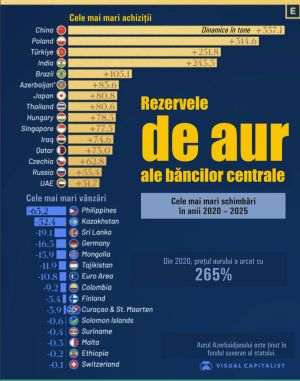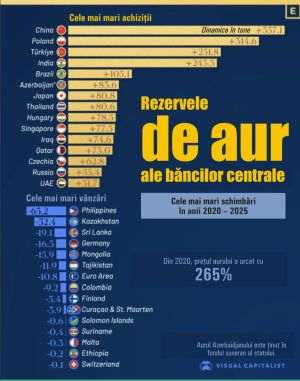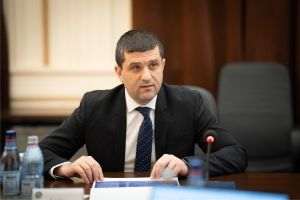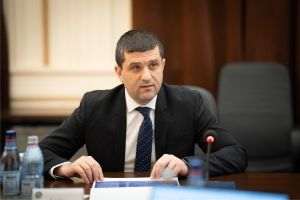• Interview with the CEO of the East European metallurgic division of "Mechel"
Reporter: What is the current situation at the Romanian plants of "Mechel" din Romania?
Yury Gushchin: Between 2008 and the present, the circumstances of the global metallurgic market, especially the European one, remained unfavorable, which naturally led to a steep deterioration of the situation of the metallurgic plants. Over the last three years, the "Mechel" plants in Romania posted losses. Under these circumstances, the losses for 2009 alone have exceeded the profit of the year 2008. Aside from the overall negative evolution of the market for metallurgic products in Europe, the activity of the "Mechel" plants has also been made worse by the domestic factors, specific to the Romanian market. For example, in the last year and a half, the prices of energy commodities for the "Mechel" metallurgical plants have increased 30%. Also, as a result of the implementation of the new EU norms, an increase in the price of electricity is expected to take place in 2013.
I would like to note the fact that for "Mechel", which has never enjoyed preferential prices for electricity, but for which it nevertheless has a significant weight in the cost of its products, the price hike is very painful. I am mentioning this, taking into account the fact that over the last few years, "Mechel" has invested in increasing the energy efficiency of its equipment. In spite of this, our measures are unable to keep up with the increase in the price of the electricity. The price of electricity is just one of the difficulties we are facing. The entire combination of economic factors has made the efficient management of the Romanian companies of the "Mechel" group a very heavy task. That is why at the present time, one of the main missions of the company is to ensure its Romanian assets are as attractive as possible to investors. This involves conducting the technical-productive processes -and the development of the products in the volumes which are requested by the market today, at the lowest manufacturing and sale costs.
Reporter: How will you succeed in achieving these goals you have set for yourselves?
Yury Gushchin: In order to achieve the aforementioned objective we had to resort to optimizing production and drastically cutting expenses, including the optimization of the ranges of products we make, shutting down some divisions and optimizing the number of employees. The laid off employees will be paid compensatory wages in strict compliance with the legislation in effect and with the obligations of the Collective Labor contracts. We are not the only ones implementing this kind of decisions. Similar measures were taken by other metallurgic companies in Europe as well. Such measures allow keeping the overall viability of the companies. I would like to emphasize this strategy has already led to a concrete result: the company's financial results have improved compared to the previous year. We hope that our actions will lead to an improvement of the situation.
Reporter: What will happen to the plant of Câmpia Turzii, will it be shut down?
Yury Gushchin: "Mechel" hasn't planned to shut it down. Some of the production capacities of the plant, which have low profitability, will enter preservation. I stress that this is a preservation which involves keeping the equipment operational. However, the "Drawing mill" division will continue to operate normally.
Reporter: Will you continue to invest in the plants or will you halt that process until the plants are sold?
Yury Gushchin: The execution of the investments planned for 2012 is getting close to completion. We are currently completing a large investment project at Oţelu Roşu, which we began in 2010. We are talking about the modernization of the complex for the elaboration of steel. We are now completing the final stage, which involves the assembly of the equipment which will allow greater efficiency in the production of steel. We also have a number of smaller investment projects at "Mechel" Târgovişte and "Laminorul" Brăila, which will be completed in the near future.
Reporter: What expectations do you have from the company which will buy the Romanian plants?
Yury Gushchin: The company's plans include finding the potential investors interested in preserving the plants and making them grow.
Reporter: There is information that "Donau" Austria has expressed its interest in buying the Romanian plants. Could you confirm this information?
Yury Gushchin: The company is negotiating with several investors who are interested in buying the plants. For now, it is too early to talk about anything concrete.
Reporter: The unionists claim that the requirements of the privatization contracts have not been met. What are your comments on those statements - what were the obligations of the investor, according to the privatization contracts, and to what extent were they met?
Yury Gushchin: "Mechel" has fulfilled all the obligations, according to the privatization contract, both when it comes to "Mechel" Târgovişte, as well as to "Mechel" Câmpia Turzii, including the investments in retooling, technological development and the environment. All of the above things were confirmed in 2007, the APAPS (ed. note: the Authority for Privatization and the Administration of the State's Interests) as well as by the EU commission, based on the monitoring of the activity of the Romanian metallurgic plants between 2004 and 2008. Thus, for the period of more than four years of monitoring, all of the aspects concerning the activity of the plants owned by "Mechel" in Romania were regularly investigated by the European experts, who conducted on site verifications on the spot, and, in conjunction with the Romanian institutional bodies, they have also presented their reports to the European Commission. As an example, we can take "Mechel" Câmpia Turzii. According to the privatization contract, we were required to invest in the technological development of the plant and in environmental measures. The privatization contract, like I have already told you, was officially fulfilled, and its monitoring stopped in 2007. Until 2011 included, "Mechel" has invested approximately 34 million Euros in modernization, retooling and environment. This amount is nearly two times greater than the amount which we were required to invest according to the privatization contract. Under these circumstances, more than 11.7 million Euros were invested in the plant after the completion of the privatization contract, when we already had no more obligations towards the state. We have invested in increasing productivity, in implementing new types of products, in improving the work conditions.
Reporter: Why were the NATO-certified machines relocated from Târgovişte to Russia?
Yury Gushchin: Ever since 2003, through the address no. 230006/07.01.2003 of the Ministry of Industry and Resources, the Special Department has announced that the "Objective < < Billets and Special Bars Forge > > of SC COST SA Târgovişte was no longer kept on the list of Defense companies and production facilities". Thus, prior to the being sold to "Mechel", those machines were excluded from the list of companies which were important for the defense of the country's defense capabilities. As far as I know, "Mechel" Târgovişte has not received any manufacturing orders from NATO since the end of the 90s. Moreover, for all the deliveries of the equipment from the Billets and Special Bars Forge, the National Exports Control Agency has confirmed that those machines were not included in the category of dual destination products, according to regulations from the EU.
Concerning the "relocation of the machines", I would like to emphasize that the main reasons behind their sale were purely commercial. A key to the competitiveness of the plant is the optimal use of the non-operational equipment, which also entails the evaluation and the sale of certain machines which the company owns, which were unused for several years and which have only generated expenses with their preservation and maintenance.
Reporter: What do you know about the meeting which was supposed to take place between the Romanian delegation of the Eastern European Division and Igor Zyuzin? Why did the Russian owner not attend the meeting? Does he intend to meet with the Romanian unionists?
Yury Gushchin: It was a planned working visit, concerning the day-to-day operations of the plants. All I can say is that Igor Zyuzin, the main shareholder of the company, is fully aware of what is happening in Romania. All the measures which we are implementing in the metallurgic plants of the group are part of the general strategy to improve the financial results of the "Mechel" Group.
Reporter: Thank you!
• Unexpected losses at "Mechel": 823 million dollars, in Q2 2012
Russian corporation "Mechel" yesterday reported an unexpected loss of 823 million dollars in the second quarter of 2012, after posting a net profit of 192 million dollars in Q2 2011.
According to the international press, the analysts were expecting "Mechel" to book a net profit of 18 million dollars for the April-June period.
In the first quarter of this year, the Russian company had net losses of 605 million dollars, compared to a net profit of 501.22 million dollars, in Q1 2011.
Concerning the results obtained in the first six months of the current year, Yevgeny Mikhel, CEO of "Mechel OAO", said: "The first half of 2012 saw a number of key events for the Group - we have run a large scale process for the restructuring of debts and we have launched the company's new strategy to spin off any non-core assets, to improve the operating cashflow and to reduce debt. The key markets for the products exported by the mining and metallurgic divisions of < Mechel > have seen a gradual drop in the first half of 2012. Even though the divisions of the Group had a stable evolution when it comes to output and distribution, the financial results of the Group were seriously affected, among other factors, by unusual depreciation in the balance sheet, due to a declining market and currency exchange losses. In spite of this, the company took steps to improve its financial and operational performance on the back of reducing the production costs and of expanding to new markets, thus earning a positive cashflow during the reviewed period".
The "Mechel" group has serious difficulties in Russia, according to a statement made by Mircea Scântei, the president of the "Metarom" Union Federation. Quoting a study by "Syndex", he said that the debts accrued by "Mechel" on a global level threaten the corporation's future.
The quoted study says: "In 2011, the < Mechel > group reported a net loss of 500 million Euros. The high leverage of the company is the main threat for its future".
According to "Syndex", "Mechel" has invested heavily, which resulted in a net debt three times the gross profit of 2011.
Thus, the net debt of "Mechel" amounts to about 9 billion dollars. The Group has to repay 2.7 billion dollars this year, the specialists of "Syndex" say. "If the net debt of < Mechel > will grow to be more than triple the gross profit for 2012, this will represent a violation of the covenant of a loan taken from < Gazprom Bank >, of about 1 billion dollars, which would mean that < Mechel > would be forced to increase the collateral for the loan from 25% of the shares of "Yuzhny Kuzbass" (the Group's main mining company) to 35%". Experts consider that the breach of the covenant can not be avoided.
In order to reduce its debt and to finance a mining project, the Russian group put up many assets for sale, including the companies controlled by "Eastern European Steel Division" SRL, which coordinates the activities of the corporation in Romania.
Last week, "Mechel" announced that it intends to sell the five plants in Romania ("Mechel" Câmpia Turzii, "Mechel" Târgovişte, "Laminorul Brăila" and the two "Ductil Steel" plants) in exchange for 150 million dollars.
Thus, "Mechel" Târgovişte, which was acquired for 4 million dollars, would be sold at a price of 46 million dollars and "Mechel" Câmpia Turzii, which was acquired for 3 million dollars, would be put up for sale for 33 million dollars. Also, after paying 39 million dollars for it, the Corporation is asking 198 million for "Ductil Steel", whereas for "Laminorul" Brăila, is asking for 32 million dollars, after having acquired it for 12 million dollars, according to the Russian press.
The Russian company hopes to make a total of 859 million dollars from the assets it has put up for sale, after having paid 2.04 billion dollars to acquire them.












































